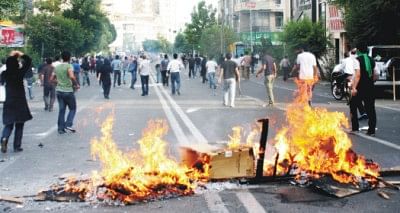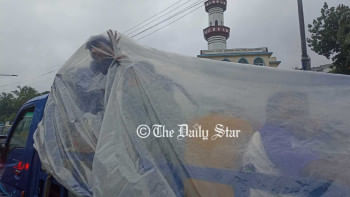Green Revolution in Tehran?

Who ultimately benefits from the political turmoil in Iran?Photo: AFP
THE on-going post-electoral turmoil in Iran is hardly unusual in developing countries, and has precedence in Eurasia, the world's new-found hydro-carbon-rich region. It may be recalled that the US-led transatlantic community bequeathed similar turbulence when it helped foment in Georgia and Ukraine the glorified names such as the Orange Revolution, Rose Revolution, and so forth.
Iran, though projecting the West's problems in the Middle East, is in fact a greater source of discomfort to its detractors because of its enormous influence in the Eurasian region. What is being televised from Tehran today is of a piece with the orchestrated move that has changed the definition of sovereignty also in other parts of Eurasia from Belgrade to Kiev and beyond -- the area now considered the lynchpin for world domination.
In this connection, it is worth listening to President Carter's National Security Adviser Zbigniew Brzezinski, the man responsible for starting the related business of "jihad" in Afghanistan. Here are his concerns published in Foreign Affairs (September-October 1997):
"Eurasia is home to most of the world's politically assertive and dynamic states. All the historical pretenders to global power originated in Eurasia. The world's most populous aspirants to regional hegemony, China and India, are in Eurasia, as are all the potential political or economic challengers to US primacy. After the United States, the next six largest economics and military spenders are there, as are all but one of the world's overt nuclear powers, and all but one of the covert ones. Eurasia accounts for 75% of the world's population, 60% of its GNP, and 75% of its energy resources. Collectively, Eurasia's potential power overshadows even America's. What happens with distribution of power on Eurasian land mass will be of decisive importance to America's global primacy."
Brzezinski's observation, though more than a decade old, points to the stakes involved for the West, which is genuinely anxious over the re-election of a hard-liner in the Iranian election -- particularly after infuriating both the US and its strategic ally in the Middle East, Israel, in the very first term of his presidency.
The US had also been a close ally of the Shah's Iran which was a pillar in the former's twin pillars of security (the other being Saudi Arabia) in the strategic region of the Gulf. Aware of her limitations in realising its agenda in Middle East without Iran, a regional power in the making, the US is eager to re-establish its old ties with an Iran ruled by moderates and on her own terms. That's at the heart of the brouhaha created over Iran's electoral result.
The ferment in Iran has little to do with the so-called quest for transparent democracy that TV anchors never tire of mouthing. For, if democracy meant anything to them, they would have allowed it to thrive in Algeria and occupied Palestine, where the popular will was by a bizarre global consensus trampled.
To the West, no inconvenient democracy can be welcome for obvious reasons. Nor strangely enough does the Iranian strife identify a verifiable Western candidate although former premier, Mir Mousavi is projected as one.
Mousavi faces limited choices: either the full force of the Iranian state will now crush him or his presumed supporters would discard him a bit later. Neither course allows for a further test of the much-hyped popular will.
His fate bears a striking similarity to that of Eduard Shevardnadze of Georgia. He became the West's new-found mascot, as long as he helped the breaking up of the Soviet Union. But when his turn came, he was thrown into oblivion just as cynically. The "popular" coup against him was named the Rose Revolution.
The real power-play being witnessed in Iran has nothing to do with an agreeable candidate for the West. The forces arrayed against Ahmednejad, i.e. those of Mousavi, Khatami, and Rafsanjani, had been in the vangaurd of Islamic revolution and ruled Iran in succession in different capacities. They all were perforce anti-West, although their degree of opposition to the West could have been different at different times.
It is already difficult to tell precisely at what point of their metamorphosis one of them becomes "moderate," and thus acceptable to the West

 For all latest news, follow The Daily Star's Google News channel.
For all latest news, follow The Daily Star's Google News channel. 



Comments